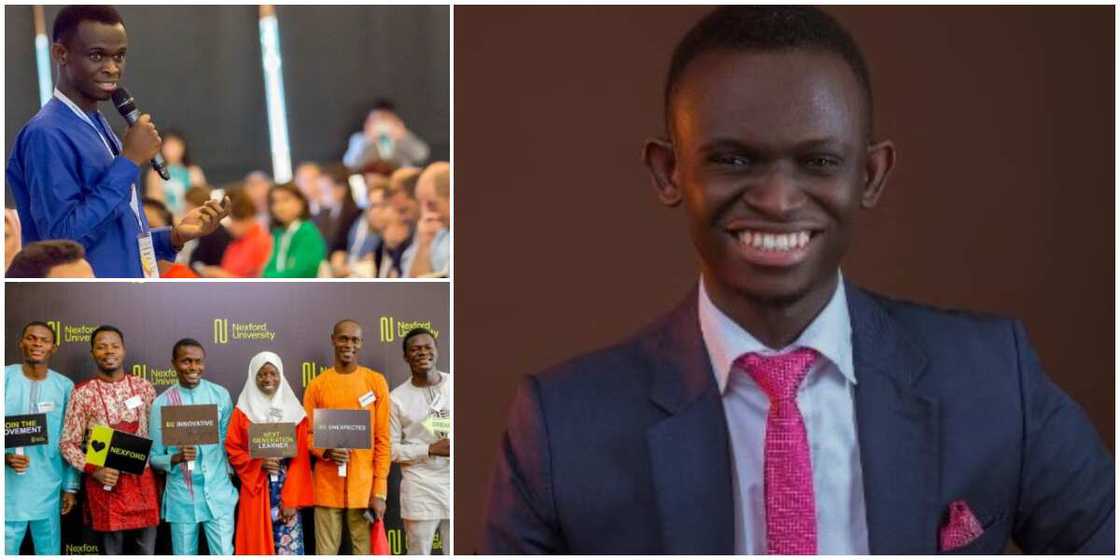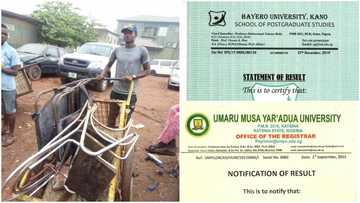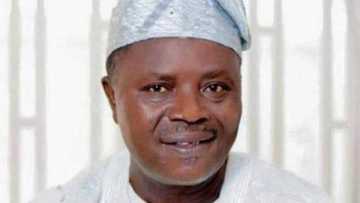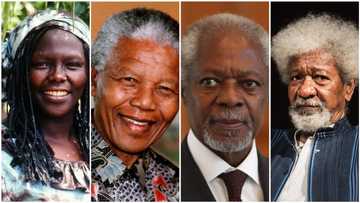Ebenezar Wikina: How Young Nigerian Man Made a US University to Change its English Proficiency Policy
A young Nigerian man, Ebenezar Wikina was willing to let go of his admission to read a business degree at Nexford University, US when the institution required that he provide proof of his English proficiency.
PAY ATTENTION: Click “See First” under the “Following” tab to see Legit.ng News on your Facebook News Feed!
Ebenezar had never written the test and sent a strong-worded response to the school that surprisingly caused them to change their stance on the subject (requirement of proof of English proficiency before admission).

Source: UGC
In this exclusive interview, he tells Legit.ng more about his advocacy against the English proficiency test required from Africans from commonwealth nations and why everyone should join the conversation.
May we meet you?
Thank you, my name is Ebenezar Wikina. I am from Kono in Khana Local Government Area of Rivers State.
PAY ATTENTION: Subscribe to Digital Talk newsletter to receive must-know business stories and succeed BIG!
I am the founder of Policy Shapers, the world's first open-source platform for policy ideas led by young people. I also work as an Advocacy Coordinator at PIND Foundation, an corporate social organization established by Chevron Corporation.
In addition to these, I sit on the British Council's Youth Advisory Board advising on the New Narratives program as well as a senior category judge of the Queen's Commonwealth Essay Competition, the world's oldest international writing competition for schools.
My work over the past 11 years in the Niger Delta has earned me recognition locally and internationally.
I was awarded the first-ever Soundcity MVP for Community Development in 2019, the Mandela Washington Fellowship in 2020, the Nigerian Economic Summit Group Bridge Fellowship in 2021, the Global Investigative Journalism Network fellowship in 2017, and two nominations for the Future Awards Africa in 2016 and 2018 respectively.

Read also
Man celebrates overcoming his disability to graduate from university, says he has a new job already
Tell us about your advocacy on English Proficiency Testing - when you started and progress so far
I have always been interested in the issue of English Proficiency Tests since 2015 when I started applying for scholarships and opportunities abroad. All this while, I had deliberately ignored opportunities that required English Proficiency tests.
However, I got the chance to directly advocate against it in 2020 when I applied for a Business degree at Nexford University, US in 2020.
I spoke against the system to the school and was willing to forfeit my admission in a heated conversation which eventually led the school to introduce a new policy called Academic Evaluation Pending (AEP) which allows prospective students to take their first course at Nexford and have their grade prove if they understand English or not.
This was a huge victory as we celebrated on Twitter last year. However, Nexford is just one university out of millions.

Read also
Social media reacts as Nigerian man makes public his movement to UK, shares pictures 9 days after he arrived
Do you think Nigerians who don't have plans to further their education abroad should join this campaign and conversation?
Yes, of course. My biggest problem with asking Africans from English-speaking countries (especially Nigerians) to write these tests is that all our systems are already built in English. We were colonized by the British; the people who own the English language.
For most of us, our first language of contact as babies is English. Our schools, churches and the corporate world are already run in English. Why then do we have to pay about 75,000 naira (more than twice our minimum wage) to prove again that we can speak English?
Also, these English tests expire every 2 years, so it means that if you don't get the opportunity you're using it to apply for within 2 years, another 75,000. Is it that your English knowledge expires? I don't understand.

Read also
After graduating with first class in math & finishing his masters, Nigerian man bags PhD scholarship in US
Do you think the government of Nigeria can do something about it or does it necessary boil down to foreign schools effecting this change?
Yes, I strongly believe the government can do something about this.
The UK Home Office has said a country can be listed as an English-speaking country if 51% of its population speaks English. Nigeria has more than 51% English-speaking citizens, but why hasn't the UK Home Office been engaged by the Ministry of Foreign Affairs to press on this?
One of the major reasons I applied to join the British Council Youth Board is because I want to be able to give a policy push to this advocacy issue and find ways to influence change through the Council.
Foreign academic institutions also have a role to play in solving this issue. Just like Nexford, they could make their admissions policy more inclusive to students from English-speaking countries around the world. I also don’t think it is right that these test scores expire. Why do they have to expire? That doesn’t seem right to me.

Read also
Yazid Surajo: Meet young Nigerian with Master’s degree who is now a scavenger, photos of his results stir reactions
What can the youths in affected countries do to bring about this desired change in making IELTS not compulsory?
There’s a petition I have been promoting over time launched by This is Africa. It currently has about 85,000 signatures and the goal is to take it to 150,000 signatures.
Young people can support by signing the petition and also utilizing social media to continue asking questions. For my people in Nigeria, we have a hashtag #NoIELTSNigeria which we’ve been using to track conversations around this topic.
What do parents or persons who are financially buoyant stand to benefit or lose joining or not joining the campaign?
The truth is that we all have something to lose and that is our dignity.
The fact that we’re not even given a benefit of doubt is an insult to everyone and whether you can afford 75,000 naira to spend for an exam that will expire in two years or not; whether you’re from West Africa or South Africa; Northern Nigeria or Southern Nigeria.
This is something that affects us all. We all need to keep asking questions and keep the conversation going.
Nigerian man bags PhD scholarship in US without a master's degree
Meanwhile, Legit.ng previously reported that a Nigerian man without masters had bagged PhD scholarship in the US.
The young Nigerian man named Nwosu said a scholarship is really sweet if one can make the sacrifice of putting in all the works.
Nwosu disclosed that he never had to write, GRE, TOEFL, pay an application fee or having a masters degree.
As if that was not enough, the university also increased his monetary offer so he can bring along his woman who he got married to in April 2021.
Source: Legit.ng




